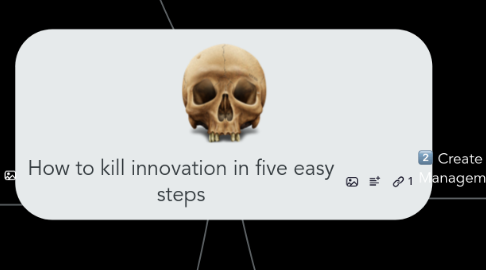
1. Don't give ownership of projects
1.1. Do Not:
1.1.1. Organize projects by committee
1.1.1.1. Individuals will have different ways of accomplishing a goal
1.1.1.2. This usually leads to stagnation and faltering projects
1.2. Do:
1.2.1. Put a single person in charge of a project
1.2.1.1. Apple refers to these people as "directly responsible individual" or DRI
1.2.2. Assign team individuals to work with the DRI establishing:
1.2.2.1. Clear Goals
1.2.2.2. Objectives
2. Rely too heavily on data and dashboards
2.1. Do Not:
2.1.1. Rely so heavily on data and dashboards that decisions go unmade due to "not enough data," or "inconclusive data."
2.2. Do:
2.2.1. Trust your Gut
2.2.1.1. know how to balace the objective numbers with emotional intelligence
3. Under-resource your hidden opportunities
3.1. Do Not:
3.1.1. Provide too many resources
3.1.1.1. this makes people sloppy
3.1.1.2. Less resources lead to creative solutions
3.1.1.3. however...
3.1.2. Continue to throw the same amount of resources at the same stuff simply out of habit
3.2. Do:
3.2.1. Be on the lookout for new opportunies
3.2.1.1. and adjust resource management to maximize the potential of these new opportunities.
3.2.1.2. Even the long shots
4. Create too many layers of Management
4.1. Do Not:
4.1.1. Overstuff your middle management staff
4.1.1.1. individuals want 1-on-1 time with key managers and decision makers
4.1.2. This leads to decreased moral, slower communication, and increased overhead
4.2. Do:
4.2.1. Flatten your organization
4.2.2. Create less hierarchy
4.2.3. Create more "face time" with the boss
4.2.3.1. keeping employees energized and on target
5. Ignore brainstorming rules
5.1. Do Not:
5.1.1. Ignore the ground rules of brainstorming
5.1.2. Create a negative environment whereby creativity is stifled.
5.2. Do:
5.2.1. Adhere to the basic tenets of brainstorming
5.2.1.1. as used by the Walt Disney World "Imagineers"
5.2.1.1.1. There is no such thing as a bad idea. We never know how one idea (however far-fetched) might lead into another one that is exactly right.
5.2.1.1.2. We don’t talk yet about why not. There will be plenty of time for realities later, so we don’t want them to get in the way of the good ideas now.
5.2.1.1.3. Nothing should stifle the flow of ideas. Not buts or can’ts or other “stopping” words. We want to hear words such as “and,” “or,” and “what if?”
5.2.1.1.4. There is no such thing as a bad idea. (We take that one very seriously.)
5.2.2. Remember Alex Osborn's quote,
5.2.2.1. "It is easier to tone down a wild idea than to think up a new one.”
